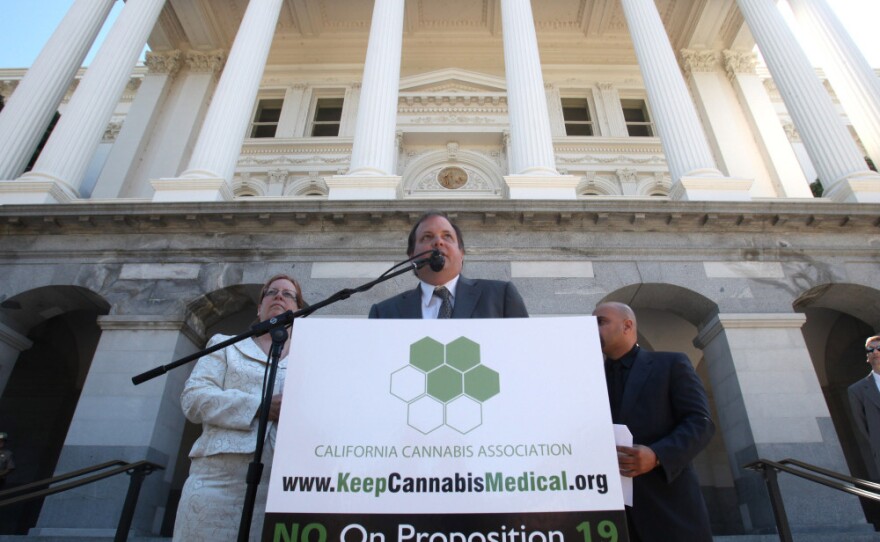In Washington, they're arguing about taxing rich people.
Much like the debate in Congress about extending the so-called Bush tax cuts, a ballot initiative in Washington state comes down to the question of whether top earners should pay more in taxes.
The initiative would create the state's first personal income tax since the 1930s. It would apply only to individuals who make more than $200,000 a year, or couples making at least $400,000.
The initiative has triggered an argument between some of the state's wealthiest citizens, with Microsoft founder Bill Gates and his father favoring the tax and current Microsoft CEO Steve Ballmer and Amazon.com's Jeff Bezos lined up against it.
That's just one of several initiatives related to taxes that are on the Washington state ballot this November. Across the country, voters will decide on measures regarding union organizing, smoking bans and whether they want to block the new federal health care law.

A Lot About Pot
As opposed to recent election cycles, there's not one issue that stands out as dominant across numerous states, like gay marriage or minimum-wage increases in past years. But medical marijuana initiatives, which have cropped up in many states, are on the ballot in Arizona and South Dakota.
Oregon, which has already approved medical marijuana usage, will decide whether to create dispensaries as a way to let people buy it. California's Proposition 19, meanwhile, would legalize marijuana sales.
If that measure passes, Oregon state Rep. Peter Buckley said Monday he would introduce similar legislation in his state next year. The motivation for Buckley, as with most elected officials in California who are backing Proposition 19, is the possibility of collecting tax revenue from legal, regulated sales of pot.
It's Money That Matters
Fiscal questions, in fact, have emerged as a top issue in ballot measures this year. Voters in Massachusetts will decide whether to cut their own sales taxes by more than half, to 3 percent. They will also decide whether to repeal a tax on alcohol.
In Missouri, voters statewide will decide whether a local income tax imposed by St. Louis and Kansas City should be subject to local voter approval. Californians will choose not only whether to tax marijuana sales but whether to erect taller hurdles preventing the Legislature from imposing all manner of fees and charges.
"There are efforts to increase revenues and to cut taxes," says Jennifer Drage Bowser, who tracks ballot measures for the National Conference of State Legislatures. "There are just a lot of things with big dollar signs associated with them."
Voters don't automatically embrace the idea of lower taxes. Massachusetts voters in 2008 overwhelmingly rejected a measure to abolish the state income tax. This past May, Arizona voters approved a penny increase in the state sales tax.
But Bowser points out that the mood may have shifted, given the continuing problems in the economy and rise of the Tea Party movement.
Who Pays The Bill
Ballot initiatives have become a big money concern themselves. Campaign spending in support of a single initiative can reach into the tens of millions of dollars. Most initiatives reach the ballot as the result of paid signature gatherers, not volunteer efforts.
They are often sponsored by people or groups who have a direct financial interest in their outcome -- often from out of state. Charles and David Koch, oil billionaires in Kansas, gave $1 million earlier this month to support Proposition 23, which would suspend California's global warming law that seeks to reduce energy consumption and emissions, until the state's unemployment rate drops below 5.5 percent.
The American Beverage Association has spent more than $14 million seeking to defeat Washington's initiative to impose beverage and candy taxes. Also in Washington, retailers and beer distributors are spending millions attacking each other's arguments about two separate initiatives that would privatize sales of alcohol.
"We're not shying away from the fact that retailers will certainly find some financial benefit about this," says Ashley Bach, spokesman for one of the initiative campaigns. But, he says, "The 'no' side has received three times the amount of money that we have."
Letting The Voters Decide
In other words, ballot measures sometimes amount to interest group warfare by other means. "The idea that impassioned volunteer citizens are collecting signatures is a romantic notion," says Bowser of NCSL. "The initiative process is owned -- lock, stock and barrel -- by the moneyed interests. There are very few exceptions to that."
Paul Jacob, president of Citizens in Charge, which promotes the initiative process, does not agree. There are certainly moneyed interests behind many ballot measures, Jacob says, but he points out that they don't always win. It's still up to the voters.
This year, Jacob notes, a number of measures were put there by legislatures themselves. They've seen that contentious measures that win voter approval can have a lot more impact -- and influence in other states -- than laws passed by politicians themselves.
"It's this desire to affect the national debate at the state level," Jacob says. "They want voters to be focused on it. They want that success at the ballot box, not just in the legislature."
Copyright 2022 NPR. To see more, visit https://www.npr.org. 9(MDAzMjM2NDYzMDEyMzc1Njk5NjAxNzY3OQ001))






